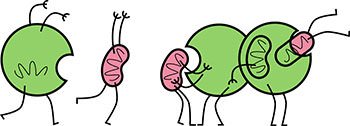We all need to eat, but not so much -- especially to get life-extension benefits. The benefits of calorie restriction have been demonstrated many times in recent years. Whether it's from intermittent fasting, longer fasting, or not eating as much overall, eating without starving has been shown to increase the lifespan of 20 species of animals, including our close relatives the primates.
Oddly enough, simply smelling food could influence the aging process as well, which can be shown by looking at the autophagy (cellular recycling), food absorption and olfactory neurons in the C. elegans worm. This has recently been studied and published in PLOS Genetics
Autophagy allows sensory neurons (like those for smell) and nutrient levels (from food) to work together to influence the lifespan of an organism. Autophagy also reduced the insulin growth factor (IGF). Digging deeper into the complex communication environment of our cells could help us understand and directly affect obesity even the aging process.
Researchers looked at autophagy in the brain, the intestines and the communication between the G.I. tract and the brain and back. The presence of food in our body is not the only way food can affect us it seems. Being on a diet and not eating much aren't the only things that influence the brain and G.I. tract. Olfaction (neurons detecting smells) also influences the brain and G.I. tract, and somehow acts like calories to reduce the impact of life extension through calorie restriction. This was shown in previous research with fruit flies a well.
In order to gain the benefits of an extended lifespan from limiting a diet, autophagy must be functional. The smell of food alone affects autophagy through the olfactory neurons, which affect communication between the brain and the G.I. tract. Autophagy is involved in the aging process, and at least in the worm, it seems that autophagy in the olfactory neuron secretes neuron signals that influence the aging process.
Scientists don't exactly know yet why calorie restriction extends lifespan of many animals. It's believed by many that a diet or calorie restriction adjusts the metabolism and physiology of an organism from the cellular level.
Next up for the team of researchers is looking is figuring out which proteins regulate the aging process, as well as look for specific autophagy inhibitors and activators that can trigger an increase or reduction in lifespan. Autophagy also plays a part in diseases, where the less autophagy means the disease process will be exacerbated and get worse, while an increase in autophagy has the opposite effect.

Being able to manipulate the autophagy process can lead to scientific breakthrough to cure diseases, eliminate obesity, and increase human lifespan to who knows how long. This is pretty exciting, but I am always cautious about human minds tampering with the finer complexities of the human organism. Hopefully there won't be any negative side-effects to whatever they come up with.
Thank you for your time and attention. Peace.
References:
https://medicalxpress.com/news/2017-08-it-not-just-what-you.html
https://www.sciencedaily.com/releases/2017/08/170802092008.htm
http://www.belmarrahealth.com/food-calories-food-smell-contribute-aging-process-study/
http://journals.plos.org/plosgenetics/article?id=10.1371/journal.pgen.1006764
If you appreciate and value the content, please consider:
Upvoting  , Sharing
, Sharing  or Reblogging
or Reblogging  below.
below.
Please consider supporting me as a Steem Witness by voting for me at the bottom of the Witness page; or just click on the upvote button if I am in the top 50



